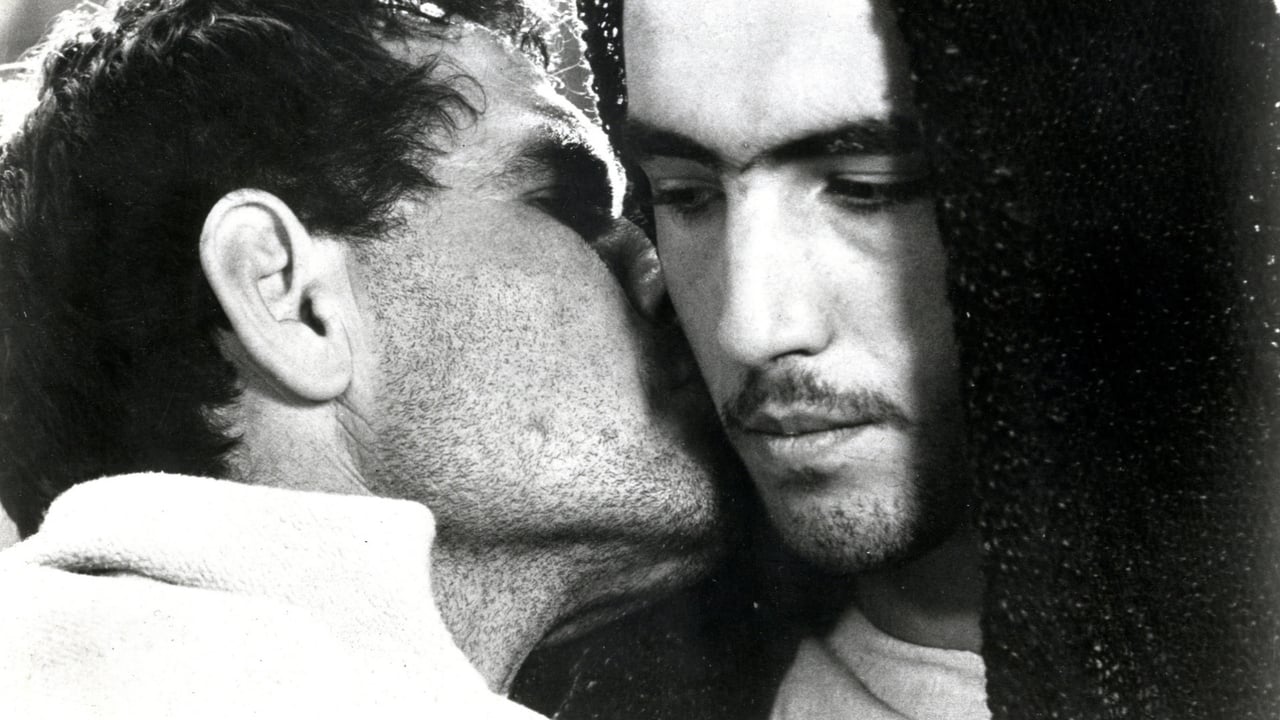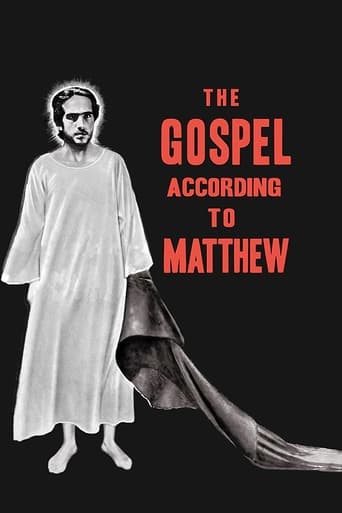

Pier Paolo Pasolini's Il vangelo secondo Matteo (1964) certainly is different from most other Passion presentations. The look of the film is rather rustic, as most is filmed in natural, outdoor, settings. The cities of Matera and Apuilia are supplemented by some sixteen other Italian locales, all highly artistic yet natural.There's an absence of elaborate costuming and period sets, with an often stark look giving at times a documentary feel to the proceedings. Pasolini's Christ, played by Enrique Iirazoqui, is quite level-headed in his orations and lacking in dramatics.The DVD I received is a "doctored up" 90 minute colorized version with dubbed English dialogue, which I feel doesn't do justice to the original work. However, the disc contains as one of its supplemental features, the black and white 137 minute film. The latter, I feel, is the film Pasolini made and the one to see.Since this writing a Blu Ray disc has been released (in 2012) with the 137 minute timing; I'm sure this is the preferred version to have.The music, from Bach to Odetta, is certainly one of the film's more intriguing aspects which supplements a most original rendering of this often filmed story.
... View MoreHere is a real oddity; a religious film directed by an atheist and Marxist, Pier Passolini. I share his non religious views, as a retired Catholic myself, but I can still appreciate the aesthetic beauty of the Sistine Chapel and other vestiges of the Roman church.St. Matthew, as the title implies, is based upon the writings of Matt. The black and white imagery, with long silent stretches, relies heavily on the actor's expressions, rather than dialogue. Many amateurs were used, including Passolini's mother as the Virgin Mary. Somehow, it works, as the cast is surprisingly good. Enrique Irazoqui plays Jesus as a wandering Jew, excuse the expression, roaming about and speaking a message of love to strangers he meets along the way. There is no preaching or piety, just a simple story of a man spreading the word of tolerance and salvation. The cinematography is somber and I was impressed by the simple and straightforward approach that Passolini used in creating this often overdone biblical story.
... View MoreFrom 1903's Passion play, to Mel Gibson's anti-Semitic gore festival, The Passion of the Christ (2004), the story of Jesus as written in the new testament has been a cinematic staple since the start, and whilst there are many variations and interpretations, they have largely been produced by absolute believers. However, after a visit to Pope John XXII, who in the early 1960's was reaching out to non-Catholic artists, and a reading of the gospels, the Italian film maker, Pier Paolo Pasolini - vocal atheist, homosexual, and Marxist, - undertook a quite direct, and literal interpretation of the story of Christ. But unlike the usual productions of this narrative, Pasolini's film has none of the dramatic inventions of a more "mystical" interpretation such as The Greatest Story Ever Told (1965), which was produced a year after this with a huge budget, starring Charlton Heston, and made under the machinations of the Hollywood system.At this stage in Pasolini's career, he was still working within the neo- realist trend that had perpetuated in Italy in the post-war years. He brings this more loose style of film making to this "great" story. What he also brings is another trend of this movement, which was the use of non-actors. But fundamental to the directors work, and particularly this film, is his political views. His depiction of Jesus is that of a political thinker, and an advocate of social justice. The choice to watch this film at this time was purely coincidental, but it dawned upon me the significance of the message. In a week in politics in the United Kingdom where our current government's budget revealed heavy cuts to the taxes of the very rich, whilst the poor of the country are told to live in austerity, there is a very simple line spoken by Jesus (Enrique Irazoqui) - which should have been utilised by the occupy camp that was moved away from St Paul's Cathedral in central London, he states: "It would be easier for a camel to get in the kingdom of heaven, than it would be for a rich man."Whilst I consider myself an Atheist, the message of these gospels are very clear, and yet we still live in a world where the rich get richer, and the catholic church gets sickeningly richer. To use a very tired, and over used statement in popular culture: What would Jesus do? If there were to be a second coming, surely he would not be pleased. Anyway, I digress. I believe that some of this may be Pasolini's point. If the story of Jesus were true, then his message was clear, and even if he never even lived, the fact of the matter is that his message is clear, and yet the people who follow his teachings largely simply ignore this and interpret to whatever means they feel is right.As previously stated the film is shot in the cinema verite style and this helps give the story not only realism, but a gravitas that is lost in the more lavish productions. The film looks absolutely beautiful, and this is helped by the incredible southern Italian setting, which adds a seeming reality. Without question, this is the greatest film of the story of Christ, and clearly influenced the later Martin Scorsese film The Last Temptation of Christ (1988). Even if you (as I am) are not a believer, this film is more about the crimes of social injustice, and the division caused by wealth. Essential film making.www.the-wrath-of-blog.blogspot.com
... View MoreThe master of old Italian Pier Paolo Pasolini retells the tale of Jesus through the eyes of the Gospel of St. Matthews. A famed atheist and homosexual it was hard to envision the reasons behind making such a movie, especially one which does not ridicule Christian religion, but embraces its most famed prophet. True to the form of neorealism the story is kept as close to earth, natural and raw as possible. The whole film is casted by non-professional actors with the main character Jesus played by an unknown 19-year old Enrique Irazoqui.In regards to a movie so deeply engraved into the history of cinema it remains hard to be without faith and awe. Pasolini is a filmmaker placed highly in all film circles - from critics to creators. Truly significant is his input into modern cinema and the evolution of film language. As such "The Gospel..." is one of his most crowning achievements. But also one of the least accessible by modern standards. For non-believers the movie will remain tiresome, dull and inconsequential. While the rest will not need to watch the movie to uphold the faith. Even more so that Pasolini may have been - in all his honesty behind making this movie - also making a sincere statement, which may not ring well with most Christians. The segments of the Bible portrayed almost unanimously show contempt to religious structures and those who wish to capture faith without rigid rules. Some well balanced cherry picking also allows to prominently front parts of scripture, which fit nicely with Pasolini's communist beliefs (albeit putting the movie into any sort of Marxist context would be severely overstepping it). Surprisignly however Pasolini cut the movie away from emotionality and interaction, making large portion of the movie almost dry readings of the Gospel. The portrayal of Jesus can be perceived as a cold, at times ruthless or even sectarian persona, devoid of most of the warmth which permeates the Gospel itself. Even though most of the script is copy pasted from the Bible some of his lines are those of the most harsh, divisive context. I am not fully sure if this detached from feelings son of God was introduced by Pasolini on purpose, but I felt rather negative about Jesus, as someone who is more probable to invoke religious hatred than messages of love and forgiveness. The emotionless Jesus telling his sermons to a poor and destitude crowd never once instills any sort of reaction on their part, which brings to question what the hell happened to Jesus Christ the Superstar?The whole irony is that the movies biggest strengths work against it, whilst at the same time providing it with enough class to remain a masterpiece. The cinema verite style of filmmaking, which hijacks the movie, gives it a sense of realism inherit to the imperfection of a human face and diverts it from the appalling norm of Biblical epics. Covered in dirt and grime the story of Jesus gains depth and substance, but at the same time the refusal of Pasolini to adapt the Gospel into something more like a film script forces the movie to be a seriously bumpy uneven ride. The realism of the scenery, people and situations conflicts drastically with the lack of emotion and interaction. This forced Pasolini to make a movie very lacking in casuality, while deeply interwoven in images and biblical messages.One of the biggest payoffs in Pasolini's movie is the use of music, especial of modern gospel singing, to make an engrossing and involving atmosphere, which helps to get caught up in the action. Nonetheless the movie is slowly paced and for most viewers it may be hard to endeavour sitting 135 minutes without at least one nap in between.The movie technically feels a bit outdated, especially in most panoramas or landscapes, where the camera remains shaky and unfocused. At the time it may have added to the neo-realism, but nowadays it detracts a bit from the overall experience.
... View More